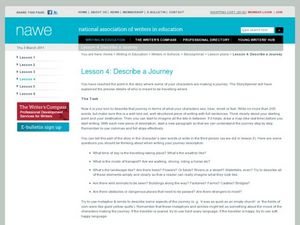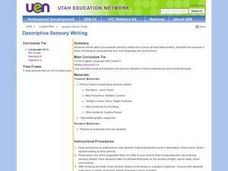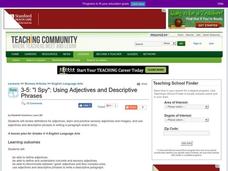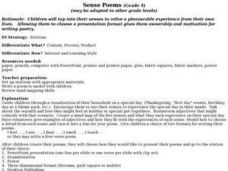Curated OER
Describe a Journey
Learners describe the sensory experience of a character's journey in an essay. In this precise details writing lesson, students explain the effects on the senses of weather, time of day, landscape, and other experiences. Learners use...
Curated OER
Let's Go Exploring!
Use a Courbet painting of a cave or tunnel opening to reinforce the importance of descriptive writing. Writers of all ages use sensory details to describe what the scene depicts as they pretend to be in the painting. Then they imagine...
Poetry4kids
How to Write an Alliteration Poem
Learners follow five steps to compose an alliteration poem. They choose one consonant and brainstorm as many nouns, verbs, and adjectives they can think of to create rhyming sentences that come together in a poetic fashion.
Curated OER
Oceans: A Sensory Haiku
Students create an ocean haiku. In this haiku lesson, students use their five senses to write a haiku. Students watch videos about the ocean, make a sensory portrait, and create a class haiku.
Brigham Young University
Out of the Dust: Guided Imagery
A guided imagery exercise is a great way to get readers thinking about writing. As part of their study of Out of the Dust, Karen Hesse’s 1998 Newbery Medal winning verse novel, class members listen to a reading of one of the poems from...
Novelinks
Tuck Everlasting: Similes, Metaphors, and Personification in Imagery
Poetic language is abundant in Natalie Babbitt's beautiful novel, Tuck Everlasting. Learners note the examples of similes, metaphors, and personification they find as they read, and illustrate how the language creates a sensory...
Curated OER
Maniac Magee: Found Poem
Instruct your readers to scrounge through the pages of Maniac Magee in search for descriptive passages or words they may use to write poetry. As they look for meaningful, sensory descriptors in Jerry Spinelli's novel, readers connect to...
Curated OER
Descriptive Prompt: Precise Language
Incorporate sensory details into a piece of descriptive writing. First, elementary and middle schoolers improve a piece of writing by using precise, vivid language, as well as appropriate word choice. They then listen to a variety of...
Curated OER
Narratives
Add to the narrative writing experience. Elementary or middle school writers listen to the teacher read a descriptive passage, then reread the same passage silently. They highlight sensory details and figurative language, then orally...
Curated OER
A Creative Presentation
Bring writing to life with this lesson in which elementary and middle schoolers create a display of the imagery they identify in a series of Gary Paulsen books. They read the suggested materials, identify imagery and descriptive...
Curated OER
The Personal Narrative - Part Two
Does your langauge arts class journal frequently? Extend one of your journaling activities by having your writers choose a journal entry and take it through the five stages of writing. They will use the attached graphic organizer to...
Curated OER
Sense Poetry
Access your young poets' senses and emotions with this activity, which guides them through the process of writing a "sense poem." After working on a sense poem as a class and modeling the procedure, individuals work on their own poems...
Curated OER
Picture This
Elementary writers practice writing descriptive paragraphs by adding adjectives and sensory words to their writing. They use a picture of a monster for their descriptive paragraph. This 12-page lesson should increase your charges...
K12 Reader
A Special Summer Day
Young writers craft the story of a special summer day, detailing the event and why the day was so memorable.
Practice Using Lively Language
Practice Using Lively Language
Combine a study of biography writing with some tips for spicing up writing. After reading two passages, one much more descriptive than the other, pupils examine what makes one more interesting. They then brainstorm some ideas for writing...
Berkshire Museum
Nature Journaling: Experience the Outdoors Through Writing and Drawing
Step into the great outdoors and develop young scientists' skills of observation with a nature journaling lesson. Given a specific focus or goal, children practice making and recording observations of nature through written descriptions...
Curated OER
"I Spy": Using Adjectives and Descriptive Phrases
Students define adjectives and use adjectives and descriptive phrases to write a descriptive paragraph. They write a description of a sensory item, and read and discuss a five senses chart. Students then complete a chart using adjectives...
Curated OER
Sense Poems
Students explore 5 senses poetry. In this poetry writing lesson, students visualize a special day and brainstorm related vivid adjectives and phrases. Students create mindmaps of the five senses to go with their visualization and write...
Curated OER
Writing Descriptions of "My Favorite Place"
Students write a descriptive writing piece. In this writing activity, students use a visualization exercise to add more descriptions to their writing.
Curated OER
Reflecting/Writing after a field trip or other experience
Students reflect on field trips in writing. In this journal writing lesson, students write about a recent experience by using 4 of their senses to tell what they remember. They turn these into poetry.
Curated OER
Color Poems
Students describe colors. In this descriptive writing lesson, students brainstorm color descriptions using all of the senses except sight. Students write poems including similes, sensory images, and interesting word choice. Examples are...
Curated OER
15 Seconds of Fame
Students write an autobiographical essay. In this writing lesson students read a narrative, Panic in Paris, and review the elements of a narrative as a class discussion. Well-known stories are used as examples for writing their own...
Leicestershire County Council
Developing Handwriting Skills for Individuals with Autistic Spectrum Disorder
Here is a resource packed with strategies to help individuals with ASD improve their handwriting skills. Intended for the teacher or specialist, the resource provides background information on reasons learners with ASD have difficulty...
Poetry4kids
Evoking the Senses in a Poem
Budding poets choose a topic for a sensory-filled poem. Authors describe that topic using detailed language based on the five senses. Then, switch the senses to create a fanciful poem intended to add a touch of fun to the objective.
Other popular searches
- Writing Sensory Words
- Using Sensory Words in Writing
- Writing Using Sensory Detail
- Sensory Writing Prompts
- Sensory Writing Rubric
- Rubric for Sensory Writing
- 5th Grade Sensory Writing
- Writing Sensory Poetry
- Multi Sensory Writing
- Writing With Sensory Details
- Sensory Writing Activities

























